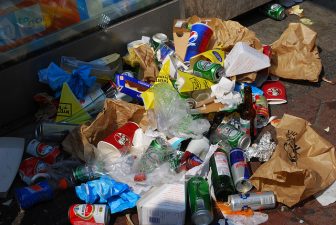 Jonathan Bloom, author of “American Wasteland,” explains why the environmental impact of food waste is rarely acknowledged.
Jonathan Bloom, author of “American Wasteland,” explains why the environmental impact of food waste is rarely acknowledged.
 Because most food decomposes into the ground (even McDonald’s), people assume that leftover food makes a small impact. But by the time food reaches our table, it has already used enormous amounts of natural resources for growing, harvesting, and transport. Then there are the pesticides and other chemicals used in modern food production. When food remains uneaten, those resources have served no purpose. And much of the wasted food, whether left at the farm, grocery store, restaurant, school, or home, ends up in a landfill.
Because most food decomposes into the ground (even McDonald’s), people assume that leftover food makes a small impact. But by the time food reaches our table, it has already used enormous amounts of natural resources for growing, harvesting, and transport. Then there are the pesticides and other chemicals used in modern food production. When food remains uneaten, those resources have served no purpose. And much of the wasted food, whether left at the farm, grocery store, restaurant, school, or home, ends up in a landfill.
In his new book American Wasteland, food waste expert Jonathan Bloom tackles an environmental topic that people prefer not to think about. But food waste, especially in landfills, is a serious environmental hazard.
Solid waste emits methane, a much more harmful substance than carbon dioxide with a “global warming potential” (GWP) 21 to 25 times more than that of carbon dioxide over a 100-year period. While American landfill methane emissions are “only” the ninth-largest source of greenhouse gas, they are easier to reduce than car emissions or paper production, for example. Some estimates put the amount of American food waste at 50% of the total food produced.
In Israel, 38% of the garbage consists of organic material, including inedible material like peels and shells, as well as wasted food. As more products are recycled, the percentage of organic materials in landfills increases. Israel is seeking to increase composting and reduce organic waste.
Bloom traces the sources of food waste beginning with farms, where produce that might not survive the hazardous two-week trip to distant supermarkets is left to be plowed under. He follows the produce to grocery store chains, who reject any fruit that is mis-sized, misshapen, slightly discolored, or stored incorrectly. Once in the store, perfectly edible foods that have reached their sell-by date are culled and sent to the garbage because of overly strict regulations. And that’s without considering the vast amounts of food thrown out by the average household.
The effect of food waste on the environment can be reduced by the government paying more attention to the problem. Bloom visited Great Britain, where household waste totals decreased by 25% in less than ten years and a mere 16.5% of food and packaging waste is landfilled. Contrast that to 97% of food waste in the US, which doesn’t even collect detailed statistics on food waste.
Great Britain reduced its food waste and landfill emissions by removing misleading product labels, raising the price of landfill dumping, working with retailers to set policies discouraging food waste (even when the policies reduced their revenues), encouraging anaerobic methods of waste disposal that create usable energy, and a public relations campaign including a “Green Granny” that encouraged the public to use up their food instead of tossing it.
All of these techniques can easily be adopted to the Middle East. In Israel, a quick look at the unconsumed food on people’s plates after a wedding, or outside the shuk, demonstrates a severe lack of awareness in this area.
Also in Israel, produce languishes in the fields because of a lack of manpower to pick it. As a protest, the farmers have scheduled a two-day strike with no shipments of eggs, dairy products or produce to the stores. Much of this perishable food will undoubtedly end up in a landfill, emitting methane for the next couple of generations.
More green food posts:
Atoning for Environmental Sins in the Kitchen this Yom Kippur
Meat Prices Going Up? Tips for Switching to a Vegetable-Based Diet
12 Tips for Saving Water in the Kitchen
Hannah also writes a blog on efficient cooking, Cooking Manager.
Photo credit: storkist



